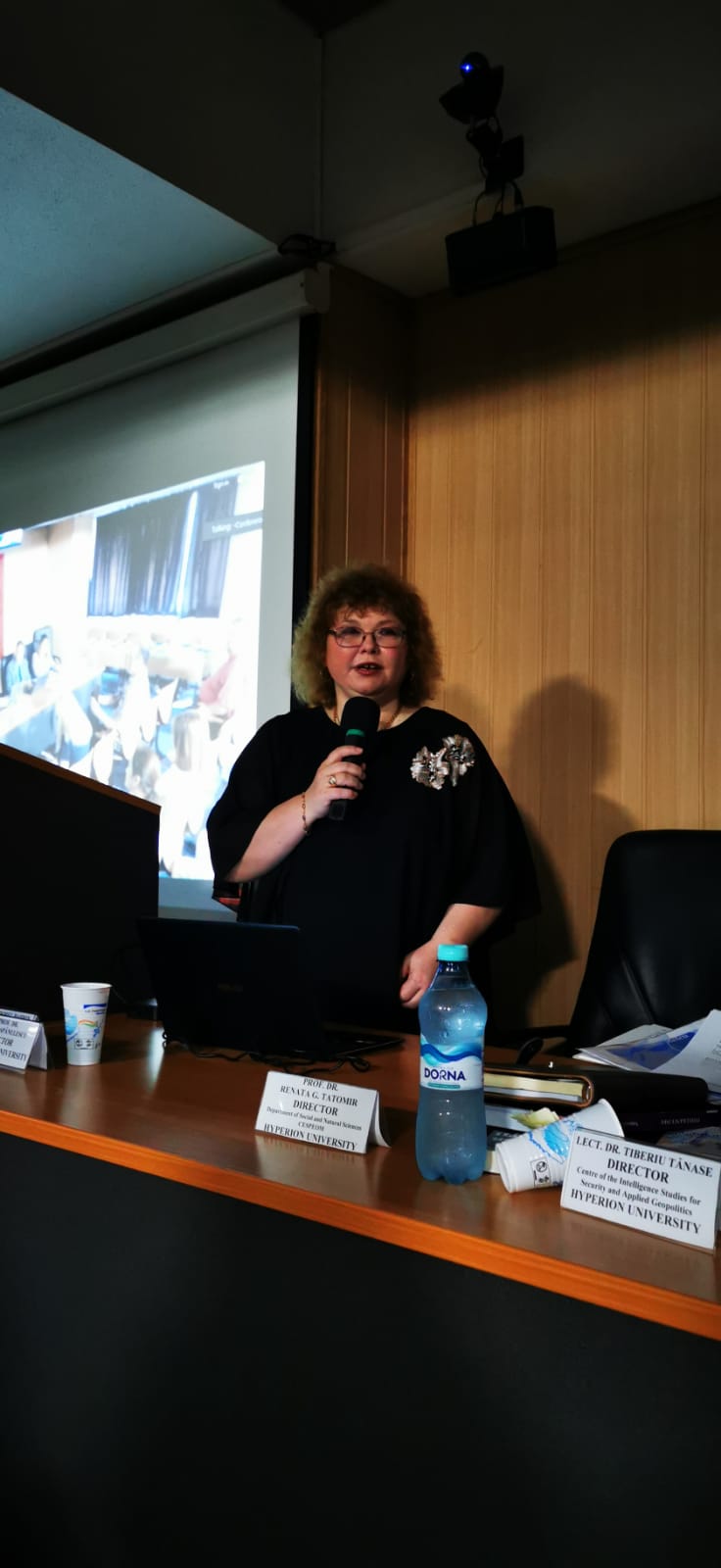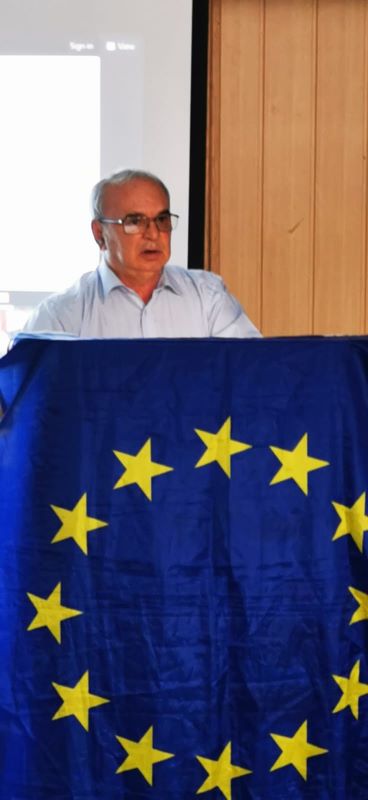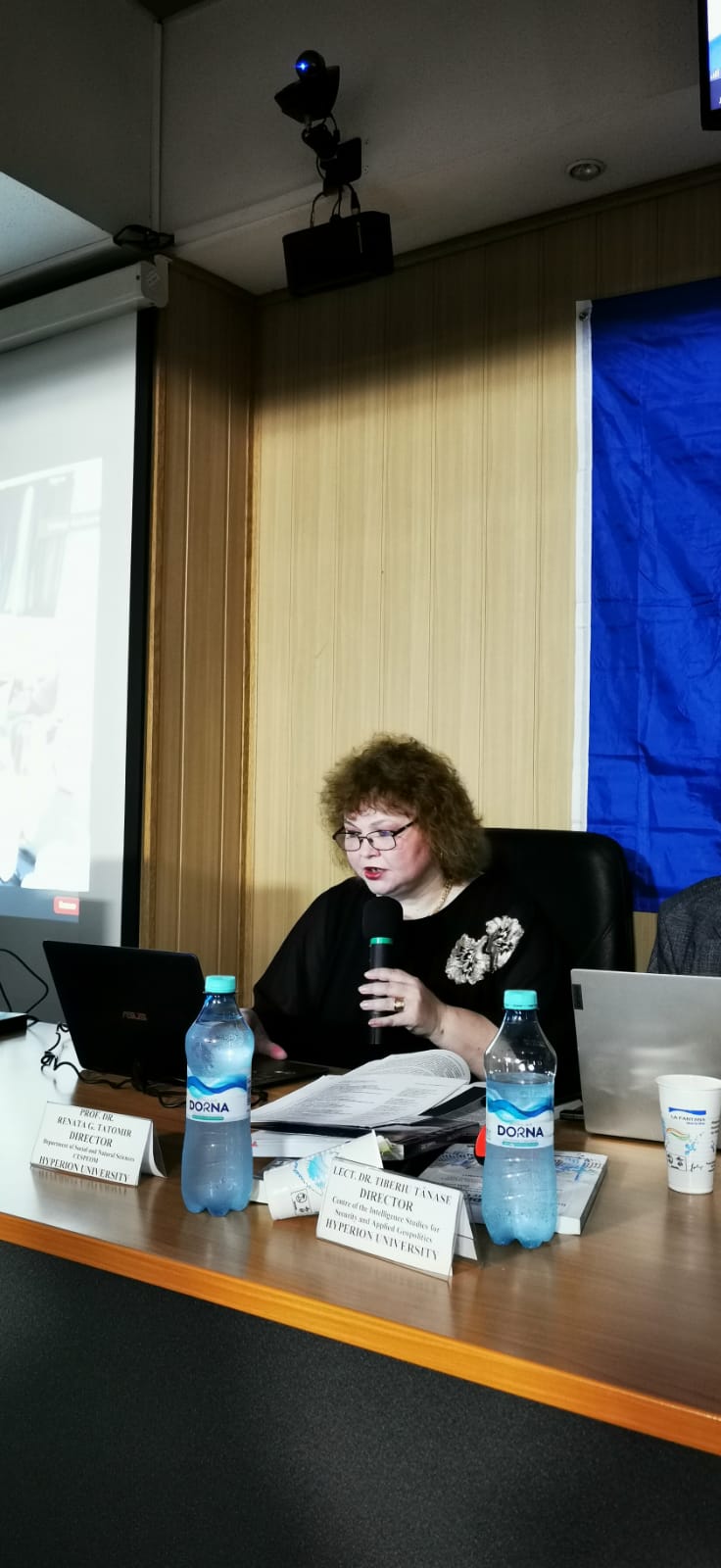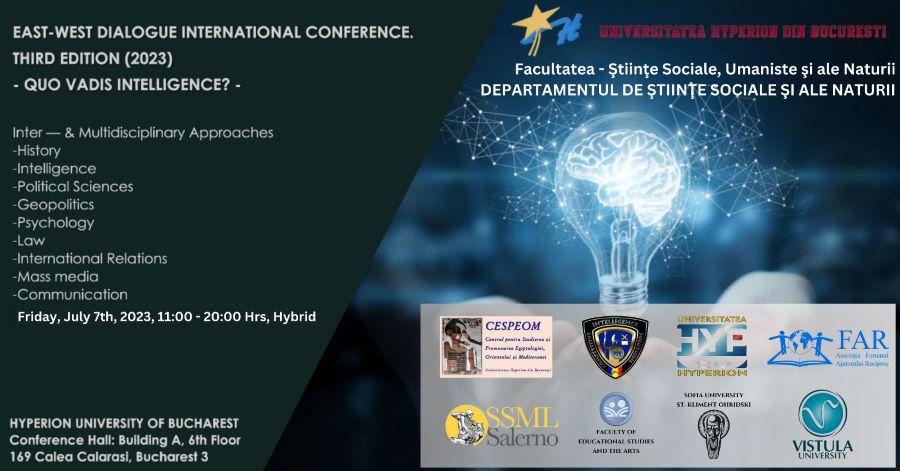:format(webp):quality(92)/https://www.economica.net/wp-content/uploads/2023/07/hyp-1-858x395.jpeg)
QUO VADIS INTELLIGENCE? Conferința internațională DIALOGUL EST-VEST, ediția a treia (2023) – București, 7 iulie 2023 – o zi plină pe toate planurile, densă informațional, bogată și variată în conținut, cu un număr impresionant de participanți internaționali și naționali, nume de elită academică, cu înalt prestigiu și valoare profesională, toți reuniți(fizic și online) la Universitatea Hyperion din București, pentru a răspunde aceleiași întrebări: QUO VADIS INTELLIGENCE? (INTELIGENȚA, ÎNCOTRO?).

Un nou proiect academic și un eveniment inovator, unic în peisajul universitar românesc, a fost realizat de Universitatea Hyperion din București, prin entitățile sale, Centrul pentru Studierea și Promovarea Egiptologiei, Orientului și Mediteranei (CESPEOM), Centrul de Studii de Intelligence pentru Securitate și Geopolitică Aplicată (CSIS&GA), Facultatea de Științe Sociale, Umaniste și ale Naturii, Departamentul de Științe Sociale și ale Naturii.
Inițiativa se înscrie în seria de conferințe internaționale și publicații ale acestora, deja consacrată și tradițională la Universitatea Hyperion, a Prof. Dr Renata G. Tatomir – East-West Dialogue/Dialogul Est-Vest – ediția din acest an beneficiind de parteneriatul pe studii și analiză de intelligence și de contribuția de înalt profesionalism a echipei centrului CSIS&GA (Președinte Lect. Dr. Tiberiu Tănase).
Ca de obicei, evenimentul s-a bucurat de aprecierea și susținerea Rectorului Universității Hyperion, Prof. Dr. Sever Spânulescu. În această ediție, domnia sa a avut o strălucită intervenție care a îmbinat cercetările din fizică și din teoria informației, lucrare care a stârnit interesul auditoriului.

Prin intermediul incitantelor prezentări cu abordări inter- și multi-disciplinare, acoperind variate domenii (istorie, intelligence, analiza informațiilor, studii de securitate, psihologie și terorism, diplomație, geopolitică, științe politice, sociologie, teoria informațiilor și fizică, politică, antropologie, literatură universală, egiptologie, studii de gen, jurnalism, edituri de profil), specialiști români și străini din Universitatea Hyperion, Ministerul de Externe, Academia Română, Parlamentul României, profesioniști din instituții și organizații de intelligence, împreună cu profesori universitari și cercetători din instituții de prestigiu internațional din Italia, Polonia, Bulgaria, Spania și Egipt au oferit tot atâtea puncte de vedere, răspunzând astfel și unor probleme pe marginea unor evenimente cu care ne confruntăm în prezent, adevărate provocări ale omului contemporan.
• de la conceptul de inteligență, definiții și vastitatea tipurilor acestuia (Renata G. Tatomir), la relația dintre dezvoltările tehnologice și transformarea serviciilor de intelligence (Tiberiu Tănase);
• de la descifrarea psihologiei teroristului, ipoteze asupra devianței, jihadism și radicalism (Stefano Amodio), la calea educației interculturale în procesul prevenirii radicalismului extremismului islamic (Melina Aallegro);
• de la reziliența societală ca răspuns la războiul kinetic, asimetric și informațional (Ovidiu Raețchi), la rolul diplomației române în timpul momentelor importante din istoria României (Teodor Meleșcanu, Șerban-Dan Predescu);
• de la oglinda mișcătoare și arma fake-news (Stan Petrescu), la considerații asupra intelligence-ului de tip strategic (Narcis Zărnescu);
• de la provocările intelligence-ului ukrainian anterior acțiuniii militare a Federației Ruse (Elena Onu), la globalizare și tehnologia informației ca provocări ale tuturor regimurilor politice (Ștefan Păun);
• de la literatură în beneficiul istoriei: memorat-ul ca dovadă istorică a oamenilor și evenimentelor (Tania Kazandjieva), la schimbări sociale și familiale în legătură cu consecințele mecanismelor negative și tiparelor culturale (Bożena Józefów-Czerwińska);
• de la Alternativa Portocalie, ca traducere a combinației dintre inteligență, umor suprarealist în lupta împotriva comunismului în Polonia (Marta Cywinska), la inteligența egiptenilor antici care au dedicat o divinitate, Nepri, cerealelor (Venice Ibrahim Shehata Attia);
• de la aplicații ale tehnicilor originale de filtrare și reconstituire a informațiilor în canale de transmisie puternic perturbate (Sever Spânulescu), la noi amenințări, riscuri și vulnerabilități la adresa securității naționale (Dorel Bahrin);
• de la tipuri de naționalism în Est: alternativa Roma la Chatbot-ul guvernamental AI din România și restabilirea identității naționale albe, heterosexuale și masculine și la Queers împotriva dronelor (Alice Iancu, Alina Grigore, Ovidiu Dumitru), la scriitori diplomatici din Balkani în serviciul diplomației culturale (Nicoleta Ciachir);
• de la România, între „gura de rai” geografică şi răspântia geopolitică (Alba Catrinel Popescu), la factori determinanți ai eficienței comunicării între instituțiile politice și militare (Ioana Alexe);
• de la Carlos Șacalul și politica antiteroristă a României în timpul Războiului Rece (Valentin Gheonea), la diplomația „atomică” la începutul Războiului Rece (Marian Harapcea) și la ce tip de analiză de informații ar trebui folosită pentru a combate războiul cognitiv (Bogdan-George Rădulescu);
• de la considerații complexe, jurnalistice și auctoriale ale temei intelligence-ului (Sorin Dumitrescu), la prezentări de cărți și reviste cu profil de intelligence, geopolitică, informații, studii de securitate, istorie (Silviu Petre, Tiberiu Tănase).
Lucrările și intervențiile celor 35 de participanți au fost extrem de apreciate de un public numeros, care a asistat fizic sau online (pe Zoom și Facebook), conferința bucurându-se de un succes extraordinar, de o mulțime de reacții pozitive și felicitări, precum și de îndemnul de a publica volumul actelor acesteia cât mai curând și de a continua seria acestor manifestări originale, benefice pentru diferite categorii de audiență, de la studenți și masteranzi, la profesioniști, dar și pentru publicul larg. În cadrul acestui eveniment publicul a beneficiat de oferta generoasă a triadei cunoaștere-înțelegere-acțiune din partea specialiștilor universitari și academici de referință în restabilirea unității, reconștientizarea valorilor și a identității românești.

QUO VADIS INTELLIGENCE? Program Conferinta

Board of Directors – Hyperion University
Prof. dr. Sever SPÂNULESCU
Rector of Hyperion University
Assoc. Prof. Dr Corina ENE
Vice-Rector of Hyperion University
Prof. dr. Anca GHEORGHIU
President of the Senate of Hyperion University
Elena SPÂNULESCU
Director of the Department for Image and Advertising
(Press Office)
Prof. Dr. Dorel BAHRIN
Dean of the Faculty of Social, Humanistic and Natural Sciences
Organizing Committee
Prof. dr. Renata TATOMIR, Director of the Department of Social, Humanistic and Natural Sciences, Hyperion University of Bucharest
Lect. Dr. Tiberiu TĂNASE, – President of Intelligence Studies Center for Security and Applied Geopolitics-CSIS&GA
Ovidiu NEAGOE, Hyperion University of Bucharest
Cezar ȘOANCĂ, Hyperion University of Bucharest
Octavian RADU, President of “Forumul Ajutorului Reciproc”
Leon TOADER Vice-President of “Forumul Ajutorului Reciproc”
Șerban Dan PREDESCU Vice-President of Intelligence Studies Center for Security and Applied Geopolitics-CSIS&GA
Elena ONU Secretary of the Intelligence Studies Center for Security and Applied Geopolitics – CSIS &GA
Interdisciplinary Scientific Committee of the Conference
Prof. dr. Renata TATOMIR, Hyperion University of Bucharest, ROMANIA
Lecturer PhD Tiberiu TĂNASE President of the Intelligence Studies Center for Security and Applied Geopolitics – CSIS &GA
Prof. dr. Dorel BAHRIN, Hyperion University of Bucharest, ROMANIA
Elena ONU PhD student, Secretary of the Intelligence Studies Center for Security and Applied Geopolitics – CSIS &GA
Prof. dr. Ștefan PĂUN, Hyperion University of Bucharest, ROMANIA
Lecturer PhD Ioana ALEXE, Hyperion University of Bucharest, ROMANIA
Lecturer PhD Alice IANCU, Hyperion University of Bucharest, ROMANIA
Lecturer PhD Nicoleta CIACHIR, Hyperion University of Bucharest, ROMANIA
*
Prof. Dr. Teodor MELEȘCANU – NSPAS, Romania
Ovidiu RAEȚCHI PhD, Secretary of State, Ministry of Foreign Affairs as the
President of the Euro-Atlantic Resilience Centre
Prof. Dr. Stan PETRESCU
Prof. Dr. Stefano AMODIO – President of the TESEO Institute, Salerno, Italy
Prof. Dr. Bożena JÓZEFÓW-CZERWIŃSKA, Vistula University, Warsaw, Poland
Dr. Marta CYWINSKA,Vistula University, Warsaw, Poland
Assoc. Prof. PhD Tanya KAZANDZHIEVA, Sofia University St. Kliment Ohridski, Bulgaria
Dr Venice ATTIA Director of Conservation researches & Training Department,
Projects sector, Egyptian Ministry of Tourism & Antiquities (MoTA), Egypt
Melina ALLEGRO PhD student Alicante University, Spain
Valentin GHEONEA PhD Student, counselor at The National Council for the Study of The Securitate Archives in Bucharest
ARGUMENT
The concept of “intelligence” goes back to the Latin verb intellegere, meaning the acquirement, processing and storage of information. From this point of view, intelligence is restricted to the cognitive, mental abilities of the human being.
However, over the last two thousand years, the concept of “intelligence” has developed, acquiring a multitude of connotations, each representing an aspect of the intelligence reporting – human, first, then of the other species – to the knowledge and understanding of the immediate and extended reality.
Of course, the development of humanity at the high level of civilization imposed the approach of intelligence from the societal perspective, and from here, the relation-intelligence-information-knowledge and applications for the benefit of humans, and the prevention of societal risks and threats, became necessary and, somewhat, dominant.
Hence, it seems wise to understand the concept of “intelligence” as a multifaceted one. Information, Intelligence, Knowledge, Thorough Understanding of the World and Realities we come across, as well as the current international developments require a combined approach of these significations, to find the most appropriate solutions for keeping the balance of international powers and for raising the standard of living of the world’s population.
In front of the multitude of challenges the current world is facing, the concept of “intelligence: and its connotations become more important than ever. Aware of this reality, we considered as a duty to organize an international conference, dedicated to this concept and its possible evolution (or involution?). That is why we included it in our series, already dedicated to the East-West Dialogue (3rd edition, 2023), which brings together distinguished academics from all over the world.
In addition, it is obvious that in each academic field of research there is a specific connotation of this concept and therefore, we decided to offer representatives from as many fields as possible to present aspects of intelligence.
Of course, the societal-informational dimension is the dominant one, because all those who operate with it have the mission of preventing possible dangers, de-escalating conflicts, achieving balance and conferring a state of security for all humanity.
This general framework served as the starting point for a highly scientific debate by representatives of the national and international academic elite, whose host was, as usual, Hyperion University of Bucharest.
The Committee of the East-West Dialogue Conference. 3rd Editon,
Quo Vadis Intelligence?
Bucharest, July 7th, 2023
QUO VADIS INTELLIGENCE?
Conference Program
Friday 07.07.2023
11:00 – 20:00 Hrs
11:00 – 11:20 CONFERENCE OPENING SESSION
• Prof. Dr. Sever Spânulescu – Rector of the Hyperion University
• Prof. Dr. Dorel Bahrin – Dean of the Faculty of Social, Humanistic and Natural Sciences
• Lect. Dr Tiberiu Tanase – President of Intelligence Studies Center for Security and Applied Geopolitics-CSIS&GA
• Prof. Dr. Renata G. Tatomir – Director of the Department of Social and Natural Sciences; Director of the Center for the Study and Promotion of Egyptology, The East and The Mediterranean
• Prof. Dr. Stefano Amodio – President of the TESEO Institute, Salerno, Italy
11:20 – 12:30 GENERAL PANEL QUO VADIS INTELLIGENCE?
Chairwoman: Elena Onu – Secretary of the Intelligence Studies Center for Security and Applied Geopolitics – CSIS &GA
11:20 – 11:50 Lect. Dr. Tiberiu Tănase, President of the Intelligence Studies Center for Security and Applied Geopolitics – CSIS &GA – The relation between technological developments and the transformation of Intelligence services
11:50 – 12:10 Prof. Dr. Stan Petrescu – The Moving Mirror and The Fake-News Weapon
12:10 – 12:30 Elena Onu – secretary of the Center for Intelligence Studies for Security and Applied Geopolitics – CSIS &GA, member of the Center for Intelligence Studies at the Hyperion University in Bucharest and PhD student National School of Political and Administrative Studies – Challenges of the Ukrainian intelligence prior to the military action of the Russian Federation
12:30 – 12:40 COFFEE BREAK
12:40 – 14:00 ONLINE PANEL: PECULIARITIES OF INTELLIGENCE THROUGH WORLD HISTORY
Chairwoman: Prof. Dr. Renata G. Tatomir, Hyperion University
12.40 – 13.00 Dr Venice Attia Director of Conservation researches & Training Department, Projects sector, Egyptian Ministry of Tourism & Antiquities (MoTA), Egypt – Intelligence of ancient Egyptians. Dedicating a deity for grains “Nepri”
13.00 – 13.20 Assoc. Prof. PhD Tanya Kazandzhieva, Sofia University St. Kliment Ohridski, Bulgaria – Literature for the benefit of history. Memorat as a historical testimony of people and events
13:20 – 13:40 Prof. Dr. Bożena Józefów-Czerwińska, Vistula University, Warsaw, Poland – Social and family changes in relation to the consequences of negative mechanisms and cultural patterns
13:40 – 14:00 Dr. Marta Cywinska, Vistula University, Warsaw, Poland – The Orange Alternative as a translation of the combination of intelligence and surreal humor in the fight against communism
14:00 – 15:00 – LUNCH BREAK
15:00 – 16:30 PANEL: GEOPOLITICS, DIPLOMACY, INTELLIGENCE. THEORY OF INFORMATION
15:00 – 15:15 Prof. Dr. Stefan Paun – Globalization and the information technology. A challenge of all political regimes
15:15 – 15:45
– Prof. Dr Teodor Meleșcanu, NSPAS – The Role of Romanian Diplomacy During The Important Moments In The Romanian History
– Șerban-Dan Predescu. PhD student, NSPAS – The Role of Romanian Diplomacy During The Important Moments In The Romanian History
15:45 – 16:00 Prof. Dr. Sever Spânulescu – Rector of the Hyperion University – Applications of original information filtering and reconstruction techniques in highly perturbed transmission channels
16:00 – 16:15
• Lect. PhD Alice Iancu – Hyperion University, Alexandra Grigore. Independent researcher – Nationalisms in the East: Roma alternatives to Romania’s Governmental AI Chatbot and the re-establishing of white, heterosexual and male national identity
• Lect. PhD Alice Iancu – Hyperion University, Octavian Dumitru NSPAS – Queers Against Drones. Queering Surveillance
16:15 – 16:25 Prof. Dr Renata G. Tatomir, Hyperion University of Bucharest – Intelligence, Where to?
16:25 – 16:35 COFFEE BREAK
16:35 – 18:35 PANEL THE MANY FACES OF INTELLIGENCE REFLECTED IN BOOKS (INCLUDING PRESENTATIONS OF BOOKS)
16:35 – 17:05 Ovidiu Raețchi PhD, Secretary of State, Ministry of Foreign Affairs as the President of the Euro-Atlantic Resilience Centre – Societal resilience as a response to kinetic, asymmetric and informational warfare
17:05 – 17:35
• Prof. PhD Stefano Amodio, President of the TESEO Institute, Salerno, Italy – In the mind of the terrorist: hypotheses on deviance; Jihadism and radicalism
• Assoc. University Prof. PhD Aurelian Virgil Băluță on Prof. PhD Stefano Amodio’s Jihadismul
17:35 – 17:45 Melina Allegro PhD student Alicante University, Spain – The Way Of Intercultural Education In The Process Of Preventing Radicalism Of Islamic Extremism
17:45 – 18:45 OTHER BOOKS
Speakers
– Gigi Alecu, General Director of Meteor Press Publishing House
– Ovidiu Boureanu, Author
– Silviu Petre, Author
Lect. dr. Tiberiu Tănase, President of the Intelligence Studies Center for Security and Applied Geopolitics – CSIS &GA – presentation of Intelligence journals
18:45 – 18:55 – COFFEE BREAK
18:55 – 19:55 DISCUSSION PANEL
NGO presentation
Interventions:
Prof. Dr. Dorel Bahrin – New threats, risks and vulnerabilities to National Security
Lect. PhD Nicoleta Ciachir – Balkan Diplomatic Writers in the Service of Culture Diplomacy
Lect. PhD Ioana Alexe – Determining factors of the efficiency of communication between political and military institutions
Valentin Gheonea, PhD Student, The National Council for the Study of The Securitate Archives in Bucharest, Romania – Carlos the Jackal and Romania’s anti-terrorist policy during the Cold War
Marian Harapcea, PhD – Atomic diplomacy at the beginning the Cold War
19:55 – 20:00 CLOSING REMARKS.